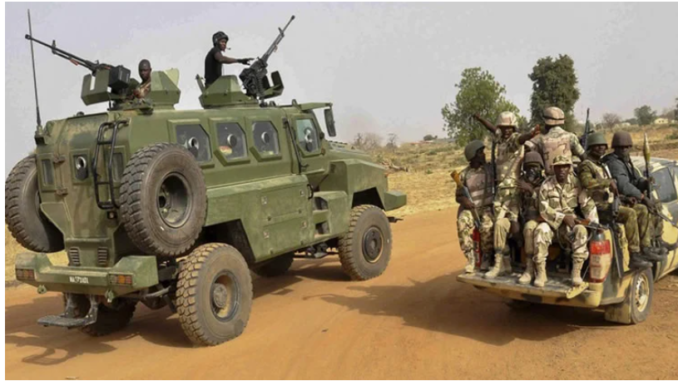
At a moment when Nigerians are trying so hard to retain hope in the military to secure, protect and defend the nation against all forms of security aggressions, the latest news report of a senior intelligence military officer conniving with the Boko Haram sect is grippingly frightening—and as such, it should spur strong, decisive actions rather than the usual paper order and mere lamentations.
The officer, Jibrin Biu, a Lance Corporal, attached to the Nigerian Army 159 Battalion in Geidam, under the Nigerian Army 27 Task Force Brigade in Buni Gari, Yobe State, reportedly disappeared for over 48 hours before he was tracked and arrested. In quite a manner which depicted defiance and a lack of remorse, Jibrin snatched a gun and took his own life. This action discountenanced a picture of a well-led, well-equipped and motivated army.
Between 2019 and now, about 130 soldiers have deserted the Nigerian Army. In March 2021, the Army declared 12 officers, and 89 soldiers wanted after deserting the waterfront in Borno State.
Two years earlier, some five soldiers attached to the Army’s 8 Division in Sokoto were declared wanted for robbing an escort on the way to Kaduna in July 2019. On a similar note, another news of soldiers deserting, involving a major general and 21 soldiers, was reported in October same year. These are worrying signs of lack of coordination, a weak sense of discipline and patriotism, and a communication gap in Nigeria’s war against insurgency. The import of this lethargy leadership on troop morale is now becoming dangerously evident.
Despite a pocket of success in the North-East, the efforts against banditry and insurgency in the North-West are not convincingly yielding rewards. The daily attacks on the roads, farmland, and villages continue across states including Zamfara, Katsina, Niger, Benue and Plateau in North-Central lend credence. Appearing to be the most devastating in recent times, a 970-passenger Abuja-Kaduna train was attacked in April in Katari, Kaduna State with at least 60 deaths and about 200 people declared missing. These incidents in the broader context of the Nigerian state– insurgency/banditry conflict underscore the hit-and-run strategy of the terrorists in the ongoing conflict, which requires high knowledge and intelligence of geography and the military operations of the country. With soldiers now deserting and some nestling in the enemy camp, the fears that the Nigerian Army is fighting enemies within have never been pronounced.
Could Nigeria be inadvertently breeding soldiers for terror groups or terrorist cells that have begun to find roots in the Army?
It is not new for soldiers to abscond from duty posts or connive with enemy forces. Traditional reasons include poor welfare packages, weak ammunition, and disbelief in a mission due to professional or personal benefits. Quite in the theatre of war the world all over, it is also a prominent strategy for terror cells to infiltrate the enemy camp to wreck it from within. However, it is strange for that to become the norm in any military as it is slowly becoming a feature here. This is why the questions above are critical for prompt and proper investigation and address.
For instance, a source in the army revealed that the deceased soldier, Jibrin Biu, was identified among fighters of the Islamist group, as they attacked Geidam, a town in Yobe State, according to the Premium Times report. As someone who was in the Intelligence Corps of the army before becoming a weapons instructor, he was believed to be contracted by the terror group to teach their members how to use firearms. It would mean that the late officer was in the rank of the Nigerian Army for special purposes. The question is how many Jibrin Biu are out there?
While it appears that no effective steps have been taken to ascertain the problem and address this immoral unprofessional conduct within its ranks, there have also been no reports of the arrest of any of the 130 soldiers who deserted service in the last three years, I feel very much obliged to share my concerns that this could encourage more displeased officers to do the same.
The leadership of the Nigerian Army must immediately hold sessions across all commands to sensitise and encourage troops on the implications of their actions on national security. While at it, proactive measures to fish out enemies within must be devised to avoid more calamities in the near future.
Similarly, the operations of the military could be reviewed and reset modalities on shifting and duties, to curb incessant incidents of deserting. It appears it is just so easy to run.
Most importantly, Nigerian soldiers deserve a better welfare package and ammunition to boost their morale and capability to stave off aggression on the field. The Federal Government could look into this for urgent action to rev up a rather demoralised military for maximum efficiency. Until Nigeria is truly safe, no penny or effort can be spared to make it happen.
Abdullateef, a Nigerian youth leader and freelance journalist, writes from Abuja
END

Be the first to comment